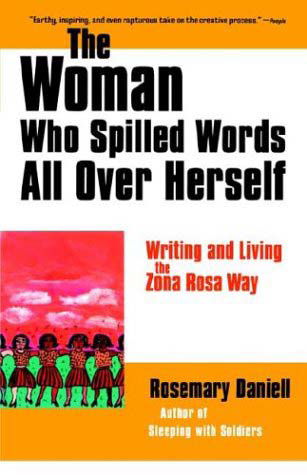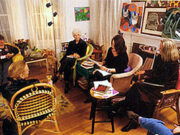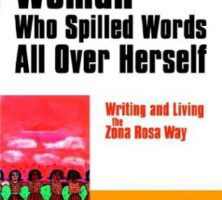A writer and a teacher of writing, Rosemary Daniell is known for her provocative poems and memoirs. Her works testify to the power of lived experience to supply rich material for writing and for the new forms of writing, especially confessional poetry and personal memoir, prevalent in women’s and ethnic literatures since the 1970s. In her stories of growing up female in the South, Daniell defies the implicit southern edict against women who publicly discuss their sexuality and anger, explores the psychology behind southern ideals of womanhood, and challenges the traditional gender and sexual roles of southern women.
Early Life and Career
Rosemary Hughes was born in Atlanta on November 29, 1935, to Melissa Ruth Connell and Parker McDonald Hughes, a tire salesman. She was the older of two daughters. After dropping out of Tucker High School in Tucker at age sixteen, she married Larry Ramos, an army cook with whom she had a son, David. Ramos was abusive, and the marriage soon broke up. She married Sidney Daniell, an architect, in 1956, and they had two daughters, Laura and Darcy. They divorced in 1968, and in 1969 she married Jonathan Coppelman, also a writer. She and Coppelman divorced in 1976.
In the late 1950s or early 1960s Daniell took a continuing education class at Emory University and fell in love with modern poetry. She began writing poetry herself. While participating in a writers’ group in Atlanta, she met the poet James Dickey, who influenced her early work. Though Dickey encouraged her to write, he was not sympathetic to the poetry of Sylvia Plath and Anne Sexton, whom Daniell greatly admired.
In 1975 Daniell’s mother committed suicide, and her father, an alcoholic, also died. That same year she published her first book of poetry, A Sexual Tour of the Deep South. The following year her second poetry book, The Feathered Trees, was published.
During this time Daniell became involved in activities that encouraged the appreciation of writers and writing. From 1971 to 1972 she served as the director of Georgia’s Poetry in the Schools Program, a national program that gives students the opportunity to work with published poets. In 1974 Daniell received a grant for poetry from the National Endowment for the Arts; she was awarded another for fiction in 1981, the same year in which she founded a creative writing workshop for women in Savannah. Similar workshops soon opened in Atlanta and in Charleston, South Carolina. Two years later Daniell named the workshop Zona Rosa, Spanish for “pink zone.” The workshops, which she still teaches, have been a critical part of her writing career. In 1987 Daniell received a grant in fiction from the Georgia Council for the Arts. Over the course of her career, she has also been granted residencies with the Ossabaw Island Project, the Ucross Foundation in Wyoming, the Writers’ Colony at Dairy Hollow in Arkansas, and Yaddo in New York.
Daniell’s other publications are a book of poetry, Fort Bragg and Other Points South (1988); two memoirs, Fatal Flowers: On Sin, Sex, and Suicide in the Deep South (1980), which won the 1999 Palimpsest Prize, and Sleeping with Soldiers: In Search of the Macho Man (1985); a novel, The Hurricane Season (1992), about a female painter in New Orleans; two guidebooks for writers, The Woman Who Spilled Words All Over Herself: Writing and Living the Zona Rosa Way (1997) and Secrets of the Zona Rosa: How Writing (and Sisterhood) Can Change Women’s Lives (2006); and a collection of essays, Confessions of a (Female) Chauvinist (2001).
Southern Feminism
In Fatal Flowers Daniell examines southern womanhood and its mythology: the ideal female as materialistic woman, wife of a powerful man, perfect hostess, and dame loyal to her land. She argues that these stereotypes inhibit women’s freedom, stultify their personal growth, and stymie the creativity of an emerging female writer.
In The Woman Who Spilled Words All Over Herself, Daniell recommends writing as a cathartic process in which the writer can distance herself from her traumas and thus vanquish the demons in her mind. Daniell seeks to reestablish her relationship with men in Sleeping with Soldiers, which draws upon her experiences working as one of two women on an oil rig off the coast of Savannah in 1979, and continues to explore this theme in Confessions of a (Female) Chauvinist. In these two books she defines “macho men,” who inveterately attract her, as men who take risks, hold fast to their opinions and prejudices, and in physical strength, mettle, and prowess embody the southern ideal of masculinity.

In keeping with her prose, Daniell’s poetry expresses her anger with candor and little sublimation; for Daniell, the latter is an unsuitable mode for poets wishing to achieve authenticity. The Feathered Trees collects the most subdued of her lyrical verse. These poems are written in a tone far removed from the emotion-laden poems of A Sexual Tour and Fort Bragg, books in which she shifts her focus to women’s experiences of writing.
Daniell’s writings attack not the South in general but those southern aspects that stifle women and their emotions. While supplying a reinterpretation of the South, Daniell’s efforts to break the silence around women’s private lives consolidate the myth of the South as a region of moral degeneration and libido, a rich reservoir of the American unconscious.
Daniell lives in Savannah with her fourth husband, Timothy Zane Ward, whom she married in 1987. In 2008 Daniell received a Governor’s Award in the Humanities for her contributions to Georgia’s literary heritage.





